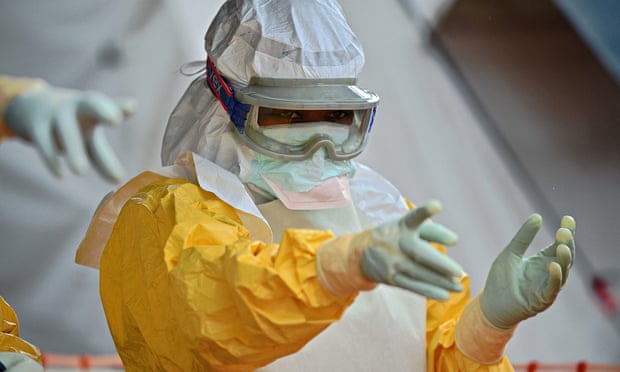With fewer than 100 cases of deadly virus reported in west Africa in last week, focus turns to contact-tracing

A medical worker in Kailahun, Sierra Leone, one of the areas worst affected by Ebola. Photograph: Carl De Souza/AFP/Getty Images
Fewer than 100 cases of Ebola have been reported in west Africa in the last week, according to the World Health Organisation, which says the outbreak has now effectively moved into the endgame.
The massive effort that went into building treatment centres for thousands of sick people was now being diverted as quickly as possible into contact-tracing. All previous Ebola outbreaks, although on a far smaller scale, have been stopped by the efficient tracing and monitoring of every person who might have come into physical contact with someone with the virus.
In Liberia, Sierra Leone and Guinea, “efforts have moved from rapidly building infrastructure to ensuring that capacity for case finding, case management, safe burials and community engagement is used as effectively as possible”, said the WHO’s latest situation report.
However, the switch in tactics was happening as scientists in Guinea said the virus could be mutating. “We know the virus is changing quite a lot,” the human geneticist Dr Anavaj Sakuntabhai told the BBC website.
“That’s important for diagnosing [new cases] and for treatment. We need to know how the virus [is changing] to keep up with our enemy.”
Researchers at the Institut Pasteur in France were trying to track mutations that could make it easier – or harder – for the virus to jump from one person to another. Viruses mutate to increase their chances of survival. Ebola is not efficient in humans because it quickly kills its host, usually before it has had a chance to infect large numbers of people, unlike flu, for instance.
Sakuntabhai said there had been several cases of people who were infected but had no symptoms. “These people may be the people who can spread the virus better, but we still don’t know that yet. A virus can change itself to less deadly but more contagious, and that’s something we are afraid of,” he said.
But professor Jonathan Ball, a virologist at the University of Nottingham, said it was still unclear whether more people were not showing symptoms in this outbreak, compared with previous ones.
“We know asymptomatic infections occur … but whether we are seeing more of it in the current outbreak is difficult to ascertain,” he said. “It could simply be a numbers game: that the more infection there is out in the wider population, the more asymptomatic infections we are going to see.”
The rapidly dropping number of cases will make it a considerable challenge to trial vaccines against Ebola. Trials of the vaccine that is most advanced, made by the British drug company GlaxoSmithKline, were due to start on frontline health and burial workers in Liberia, but there were only four cases of illness in the country last week. Sierra Leone had the most cases – 65 – while Guinea had 30. The trial is set up to compare the numbers who become ill among vaccinated and unvaccinated groups of people.
Results from a second round of safety trials of the vaccine, run by Oxford University, have just been published in the New England Journal of Medicine. They showed no safety problems, but were “a tad disappointing”, according to experts; the 60 human volunteers did not experience as strong an immune system response to the vaccine as scientists would have liked.
“These results show that the vaccine has the potential to work, particularly in the people who responded strongly, but I have some doubts about its ultimate effectiveness as the vaccine moves into tests in Africa,” said Dr Ben Neuman, a lecturer in virology at the University of Reading. To have enough of an effect, it may be necessary to add a booster jab – possibly one of the other vaccines now being trialled.
Better contact-tracing is vital to end the epidemic altogether. Currently, only half the new cases in Liberia are in people who are known contacts of those who were ill. In Guinea, 30% are known contacts. In Sierra Leone, the figure is not yet known.
The case fatality rate was between 54% and 62% in the three countries, said the WHO, and there was no sign this had improved over time. More than 22,000 Ebola cases have been reported since the start of the epidemic. Data from the WHO suggests there have been almost 8,800 deaths, but the lethality of the virus suggests the true figure is much higher.